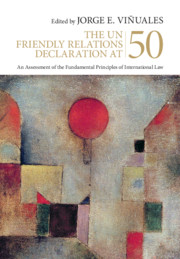 The UN Friendly Relations Declaration at 50
The UN Friendly Relations Declaration at 50 Book contents
- The UN Friendly Relations Declaration at 50
- The UN Friendly Relations Declaration at 50
- Copyright page
- Dedication
- Epigraph
- Contents
- Contributors
- Abbreviations
- Introduction
- 1 The System of the Friendly Relations Declaration
- 2 The Historical Origins and Setting of the Friendly Relations Declaration
- Part I The Principles of the Friendly Relations Declaration
- 3 The Prohibition of the Use of Force
- 4 Peaceful Settlement of International Disputes
- 5 The Duty Not to Intervene in Matters within Domestic Jurisdiction
- 6 Co-Operation
- 7 Self-Determination
- 8 Sovereign Equality
- 9 Good Faith
- Part II Fundamental Principles of International Law beyond the Friendly Relations Declaration
- Appendix The Friendly Relations Declaration (also available at www.un-documents.net/a25r2625.htm)
- Index
3 - The Prohibition of the Use of Force
from Part I - The Principles of the Friendly Relations Declaration
Published online by Cambridge University Press: 21 September 2020
- The UN Friendly Relations Declaration at 50
- The UN Friendly Relations Declaration at 50
- Copyright page
- Dedication
- Epigraph
- Contents
- Contributors
- Abbreviations
- Introduction
- 1 The System of the Friendly Relations Declaration
- 2 The Historical Origins and Setting of the Friendly Relations Declaration
- Part I The Principles of the Friendly Relations Declaration
- 3 The Prohibition of the Use of Force
- 4 Peaceful Settlement of International Disputes
- 5 The Duty Not to Intervene in Matters within Domestic Jurisdiction
- 6 Co-Operation
- 7 Self-Determination
- 8 Sovereign Equality
- 9 Good Faith
- Part II Fundamental Principles of International Law beyond the Friendly Relations Declaration
- Appendix The Friendly Relations Declaration (also available at www.un-documents.net/a25r2625.htm)
- Index
Summary
There is nothing surprising in this, remembering that the very objective of this statement of the principles already contained in Article 2 of the UN Charter is ‘to secure their more effective application within the international community’. This was a particularly topical issue in 1970 with respect to the prohibition of the use of force. It can hardly be said that this prohibition was uniformly and systematically applied after being solemnly proclaimed in the Charter in 1945. The stringency of the prohibition, presented by many as a major advance in international relations, was soon confronted with the harsh realities of practice: besides major conflicts such as the Korean War (1950–53), the Arab–Israeli wars (especially the Six-Day War in 1967) or the Indochina and then Vietnam war (which was still being waged), the United Nations had already experienced multiple flash points by 1970, from the Cuban missile crisis (1962) to the Soviet interventions in Hungary (1956) and Czechoslovakia (1967), by way of US military operations in Cuba (1961) and the Dominican Republic (1965), and the Suez crisis (1956), not counting the colonial or post-colonial conflicts (such as the Belgian intervention in the Congo in 1960) or other local conflicts. Against this backdrop, it is understandable that, if they were to continue on an idealistic or even utopian course, the UN Member States might as well see the reaffirmation of the outline definition of the prohibition of the use of force as a way to make it more effective. The solemn proclamation of the existence of the rule, which was set out at the time as a peremptory norm of international law (jus cogens), thus appeared to be a way to curb the reign of force that it seemed was to characterise international relations.
- Type
- Chapter
- Information
- The UN Friendly Relations Declaration at 50An Assessment of the Fundamental Principles of International Law, pp. 51 - 71Publisher: Cambridge University PressPrint publication year: 2020


